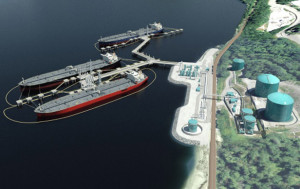
By Dene Moore, The Canadian Press
VANCOUVER – Kinder Morgan has failed to answer many of the questions put to the company about its proposed Trans Mountain pipeline through the regulatory review process, charge a chorus of critics that includes the province of British Columbia and the city of Vancouver.
Kinder Morgan ignore 40% of city’s questions
The city submitted 394 written questions as part of the National Energy Board’s regulatory review process but said the Texas-based company did not respond to 40 per cent of them, covering everything from emergency management plans to compensation in the event of an oil spill.
“We submitted almost 400 questions and only about 248 of them were answered,” said Sadhu Johnston, deputy city manager. The rest “were quite inadequate in the way they were answered, with either no answer or only partial answers.”
[quote]As interveners we are trying to assess the proposed project and are finding it quite difficult to get information on the project. That does make it hard for us to fully evaluate the proposal and to prepare our experts and our expert testimony to ask the right questions and formulate an opinion.[/quote]
Both the city and the province submitted requests to the energy board Friday asking the regulator to compel Kinder Morgan to respond to the outstanding requests.
Province stonewalled too

The B.C. Environment Ministry issued a statement saying they had submitted more than 70 information requests to the company through the board, dealing with maritime and land-based spill response, prevention and recovery systems.
“In a number of cases, Kinder Morgan’s responses to the information requests do not provide sufficient information,” the statement said. “That makes it difficult for the province to evaluate whether the Trans Mountain expansion project will include world-leading marine and land oil spill systems.”
As part of the board review of the pipeline that would link the Alberta oil sands to Port Metro Vancouver, the company had to respond to more than 10,000 questions submitted by hundreds of groups and individuals granted intervener status by the board.
No direct, oral questioning of Kinder Morgan
Under new rules for the regulatory review, there is a strict timeline and the board decided not to allow direct oral questioning of company officials. All questions must be submitted in writing ahead of hearings set to begin in early 2015.
It’s a very restrictive process, Johnston said.
“It’s really become quite undemocratic, the way the NEB is running the process,” he said.
[signoff3]
The city said the responses it did receive made it clear that the company will not cover the first responder costs incurred by Vancouver in the event of disaster and it said the responses from Kinder Morgan raise questions on the economic feasibility of the project.
Weaver: Answers ‘simply unacceptable’
B.C. Green MLA Andrew Weaver has also complained about the responses provided by the company to his 500 questions.

He filed a motion with the energy board Thursday asking for full and adequate responses and a revised review timetable to incorporate “new and reasonable” deadlines for information requests and evidence.
“Many of the answers I received are simply unacceptable,” Weaver, a Nobel Prize-winning climate scientist, said in a statement.
Kinder Morgan declined a request for an interview.
Scott Stoness, vice-president of regulatory and finance for the company, said in an emailed statement that Trans Mountain believes it provided robust responses to questions “that were within the scope of the regulatory review.”
Some of the information is market sensitive or would be a security risk to release, he wrote.
“It is normal in regulatory processes that there are debates about whether questions are appropriate and/or in scope,” Stoness wrote.
[quote]We understand some interveners may not be satisfied with the answers we provided. That is why the NEB process allows for interveners to make motions on the responses we submitted.[/quote]
They will have another opportunity to question the company and to submit their own evidence later this year, he said.
READ ABOUT Burnaby Mayor Derek Corrigan’s battle with Kinder Morgan


A Dilbit Primer for Burnaby citizens:
A PRIMER ON DILBIT
By definition, raw bitumen is crude oil with a density greater than fresh water, an API gravity less than 10o (degrees), and a viscosity greater than 10,000 cP (centipoise). Bitumen does not flow to a well bore under normal reservoir conditions and cannot be pipelined without diluent.
Extra heavy crude oil is crude oil with a density greater than fresh water, an API gravity less than 10o, but a viscosity less than 10,000 cP. Extra heavy crude can sometimes be produced to a well bore under normal reservoir conditions but also requires diluent if it is to be pipelined.
There are some formations within the officially-designated “oil sands” area in Alberta that produce an extra heavy crude oil but the regulator calls it bitumen because it needs diluent for pipelining.
The terms “oil sands” or “tar sands” refer to the same thing, and are commonly used to frame issues politically. This author prefers the scientifically-correct, politically-neutral term “bitumen sands”.
Syncrude is raw bitumen or extra heavy crude that has been processed, i.e., upgraded, either by removing some of the carbon as coke or by adding hydrogen to the carbon to make a lighter crude. Syncrude has an API gravity of 30o or higher, floats on fresh water, is easily pipelined, and is much more valuable as a refinery feedstock. Sometimes, syncrude is added to raw bitumen to make synbit for pipelining.
When about 30 percent diluent, either a gas condensate (i.e., “natural gasoline”) or refinery naphtha, is added to a crude oil to make dilbit, it is no longer crude oil because its physical properties have been changed due to the great difference in properties between raw bitumen or extra heavy crude oil and the light condensate or naphtha diluent. Dilbit is a manufactured product – not crude oil, and has an API gravity of at least 20o, the minimum required for pipelining
If dilbit is spilled into water, depending on time, temperature and wave action, the light diluent begins to evaporate leaving behind increasingly dense raw bitumen/extra heavy crude that will sink sooner or later, even in brackish coastal waters.
In addition, sediment uptake dramatically accelerates sinking of the heavy components of dilbit even in sea water.
It is widely acknowledged that only 5 to 15 percent of light oil spills in water are ever recovered and the amount of dilbit that could be recovered will be even less because its heavy components will sink, sooner or later.
Except for Enbridge’s Kalamazoo, MI spill of 20,000 bbl of dilbit, which is now up to over one billion U$ in clean-up costs and damages, there is little experience cleaning up dilbit spills in fresh, brackish coastal, or sea waters.
When Enbridge or Kinder Morgan or anyone else calls dilbit crude oil they are being misleading and dishonest and are showing they do not understand or respect the nature of dilbit.
If spilled on land, the diluent, especially if it is gas condensate, releases significant amounts of benzene and other very toxic and/or highly flammable/explosive hydrocarbons into the air. Raw bitumen or extra heavy crude residue on land is not difficult to clean up, though it does create a sticky mess, unless it gets into surface waters or underground aquifers.
Mike Priaro, P.Eng.
Calgary
403-281-2156
Author Bio
“Mike Priaro, B.Eng.Sc. (Chem. Eng.), U.W.O. ’76, P.Eng., Lifetime Member of Association of Professional Engineers and Geoscientists of Alberta (APEGA), worked in facilities, production, operations and reservoir engineering, as engineering consultant, area superintendent, and engineering management in Alberta’s oil patch for 25 years for companies such as Amoco and PetroCanada.”
“Mike increased oil production from the historic Turner Valley oilfield and brought in under-balanced drilling technology to drill out, complete and test several of the highest producing gas wells ever on mainland Canada at Ladyfern. He co-authored Advanced Fracturing Fluids Improve Well Economics in Schlumberger’s Oilfield Review and developed the course material for the Advanced Production Engineering course at Southern Alberta Institute of Technology.”
“Mike has presented his work to Canada’s House of Commons Committee on Natural Resources in Ottawa and had his work published by the Macdonald-Laurier Institute and U.S. energy industry websites.” ”Mike has no formal connection to any oil company, environmental organization, think tank, labour organization, lobbying or special interest group, academia, or to provincial or federal politics.”
“Mike is author of A ‘Canada-First’ Canadian Energy Strategy (see https://www.behance.net/portfolio/editor?project_id=5808629 ) and is available for consulting and speaking engagements.”
The Postee: I am Chips Reid, P.Eng( retired) and have collaborated with Mike Priaro since July 2012 when he proposed ” A ‘Canada-first Canadian Energy Policy” for consideration by all Canadains as a logical and economically sound alternate to the Northern Gateway and XL Bitumen for export lines which would pump DILBIT and not crude oil as we know it for ever .